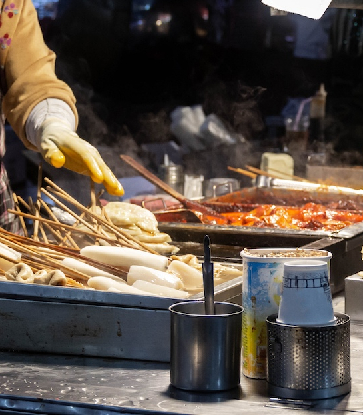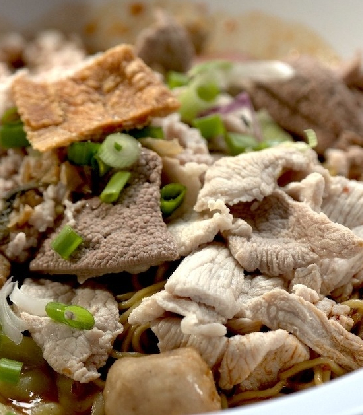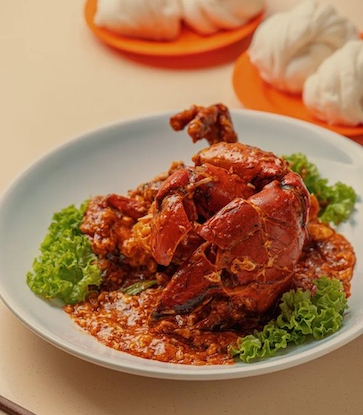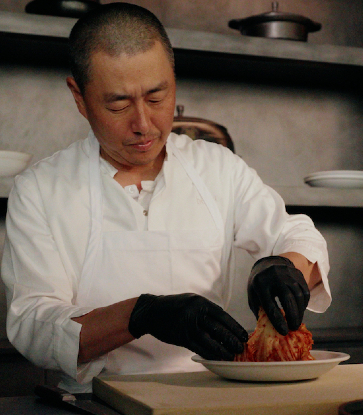Chef Vichit Mukura’s culinary odyssey began over 40 years ago as he helped his mother cook. The spark was lit, and he propelled on to taking charge of kitchens in luxury hotels. And now, he’s head chef of the One MICHELIN Starred Thai restaurant, “Khao”.
Entering the realm of culinary arts
“I grew up very close to my mother, so she would often call me to help her. She was everything to me. She was an excellent housekeeper who was very good at saving, being economical. She was also a great cook who could make what we had stretch to feed the whole family. And I was her little helper in the kitchen. I even remember the first time I made rice by myself! But I also noticed she had great influence in how I pay close attention to budgets and costs, no matter where I’m working.”
Chef Vichit Mukura, head chef of Thai restaurant Khao (One MICHELIN Star, MICHELIN Guide Thailand 2020), is a well-respected cook, originally from Pattaya. When asked about his culinary life, he began by describing his childhood with his mother, who was a major influence in how his cooking career unfolded.

Asked about his favourite childhood dishes from his mother’s kitchen, Chef Vichit doesn’t hesitate -- “Phad Phrik Khing” and “Gaeng Som Kung Tangmo Oan”. The 58-year-old chef featured these dishes on the menu at Khao, so that he could share a taste of home with his patrons. It’s no wonder that diners become regulars, looking forward to delicious meals in the warm, welcoming atmosphere here.
“At home, my mother made everything from scratch. Chili pastes, curry pastes, everything. That’s why now I can tell by listening to someone making chili paste and tasting their ‘Gaeng Som’ if they can make delicious Thai food or not. A good Thai cook can capture the three main flavours, sour, sweet, and spicy. So if they can’t make a tasty ‘Gaeng Som’, then they probably aren’t very good at cooking Thai food.”
“I can tell by listening to someone making chili paste and tasting their ‘Gaeng Som’ if they can make delicious Thai food or not. A good Thai cook can capture the three main flavours, sour, sweet, and spicy.”
A major turning point in his life occurred when, at just 16 years old, that most important woman in his life passed away. The young Vichit left school to work in restaurants, partly because of something his mother said. He remembered a conversation with her when she revealed her wish for him to become a hotel chef. So, he decided to choose the culinary path, and, with his father’s help, got a job in a kitchen at a hotel in Pattaya.
"Forty years ago, hotels didn’t have general managers who were European. This was especially true for their chefs. The chefs were mainly from Hainan, an area highly influenced by the British. When they came to Thailand, they brought the European techniques they learned there to teach us here in Thailand."

But this young man didn’t take on cooking right away. He had to prove his value in the kitchen by washing, cleaning up, and assisting for quite some time. Gradually moving up in the ranks, he eventually made it to prep work and then, cooking.
“Because of the keen attention to detail I learned from my mother, promotions came more quickly to me. First, I helped with Thai-Chinese dishes, like spicy stir-fry with evaporated milk. Back then, Chinese chefs were the innovators. Eventually, I learned Thai food and Chinese food. I learned how to master the kitchen and the stove. When I was a kid, it all looked so big, so many bricks. Before starting the stove, I always show my respect and make sure it is wiped clean. That’s how I was taught.”
Going back 40 years, Thailand did not have established culinary institutions or cooking schools. What shaped this great chef then was believing in himself and his determination to learn. Inspired and energised, young Chef Vichit’s drive rewarded him with experience in kitchens at some of the most famous hotels in Thailand, including Mandarin Samyan, Regent Cha-am, and Hilton at Nai Lert Park.

“Working at international hotels provided me with a whole new level of experiences and skills. When I worked at the Mandarin, we opened a 1,000-seat catering hall, the largest in Thailand at the time. Then I moved on to the Regent’s grand opening, where I was promoted to Chef de Partie and worked with a European head chef. After that, was the Hilton opening, working with a Japanese head chef and a team of French chefs. These experiences increased my knowledge and gave me a much more international outlook.”
At one point, Chef Vichit decided to take a break from hotel restaurants and go help his family’s restaurant for a while. Then he went back, heading south to the Phuket Yacht Club as a sous chef, which led to an opportunity to teach Thai cooking in Japan. Returning to Thailand, he oversaw the world-famous Sala Rim Naam at the Mandarin Oriental as head chef for almost three decades.
“When I was a kid, it all looked so big, so many bricks. Before starting the stove, I always show my respect and make sure it is wiped clean. That’s how I was taught.”

First-time head chef for 27 years
“I became head chef for the first time when I was just 24 years old, overseeing a team of 32. It was a very serious situation because Sala Rim Naam had already been open for three years, and not only had most of the staff started before me, but most were older than me. I had to quickly adapt and act decisively and resolutely, so I could keep my job!”
After switching hotel jobs every few years, Chef Vichit stayed at Sala Rim Naam for 27 years. So, it should go without saying that it was under his ingenious leadership that Sala Rim Naam became one of the most famous Thai restaurants in the country, generating over 100 million baht every year for the Oriental Hotel.
Another reason for his long tenure was that Chef Vichit was challenged. The hotel offered him the opportunity to go beyond overseeing a restaurant with the Oriental Hotel Apprenticeship Programme (OHAP) and the Oriental Professional Thai Chef Programme (OPTC). There, Chef Vichit became an instructor, teaching the next generation of Thai chefs and further elevating Thai food in culinary circles.

Leaving the familiar for new challenges and achieving One MICHELIN Star
“I was at the Oriental for 27 and a half years. They were like my family and second home. But I knew myself very well, and so I started looking for new opportunities. I didn’t want to do the same thing until I was 60, working in hotels. Truthfully, people were constantly asking me to go work with them. It was when I finally sent my two kids off to school overseas that I felt it was the right time to move on, find a new challenge. At first, I wanted to create a Thai restaurant brand that would function like a hotel, operated by people with hospitality experience. I thought that hotel people could adapt to the details of running restaurants more smoothly.”
This is the origin of Khao, which Chef Vichit named after the fundamental ingredient found in every Thai kitchen. (He also cultivates rice in his hometown of Pattaya.) The main inspiration for his dream restaurant is warmth and family. Diners should feel at home when they are there. He wants to serve freshly cooked food made from the finest ingredients. Every dish prepared with heart and warmth, just like his mother did when she prepared family meals. This is his simple concept -- to warm the heart of every diner.
“I say Thai food is fully balanced. There are many components with sour, salty, spicy, and sweet flavours, and we love using fresh herbs. Thai food is complex and distinctive.”

“Khao is rooted in the very essence and heart of being Thai. We cannot forget that. This restaurant is not in a contest. I don’t want to compete with others. We make food for people who appreciate and love authentic Thai cuisine. I want them to come in, enjoy their meal, and leave happy.”
The idea is simple, but it requires a keen attention to detail from the high-quality ingredients to the service befitting a five-star hotel. It’s no wonder that Khao is one of the 24 Thai restaurants that received One MICHELIN Star in the MICHELIN Guide Thailand 2020.
On winning the award, he explains, “I think it helps every restaurant improve its business. Sometimes it’s difficult to market your brand by yourself. But once you have the MICHELIN Guide helping by recommending and guaranteeing, promoting your restaurant becomes easier.”

Thai cuisine on the world stage
More than four decades of experience in the Thai culinary world, and considered a master by many. We asked Chef Vichit on how he considers Thai food when viewed from the global culinary stage.
“I don’t think Thai food is inferior to other national cuisines at all. Thai food is complete in flavour and colour. Some cuisines have no colour, while others have colour but fall short in flavour or is too heavy in certain flavours. I say Thai food is fully balanced. There are many components with sour, salty, spicy, and sweet flavours, and we love using fresh herbs. Thai food is complex and distinctive from Indian food, which features many spices. Compared with Chinese food, which often showcases dried or fermented ingredients, Thai food usually highlights mostly fresh ingredients.
“Furthermore, Thailand has so many wonderful ingredients. That’s why the restaurant is named Khao. Besides being the main ingredient in every Thai kitchen because it is consumed across the country, I also cultivate rice in Pattaya, specifically, red jasmine rice that has origins in ancient Buriram. You can find so many marvellous rice varieties along with other fantastic ingredients under the skies of Thailand. All you have to do is look. At our restaurant we use spawned banana shrimp and blue crab meat from Surat Thani, where you’ll find the freshest catches. A restaurant not only needs the best ingredients, but we also need to differentiate ourselves by having an interesting point of view and unique selling points.
“Also, restaurants like ours buy from local farmers who cultivate high-quality ingredients to encourage and support local farmers across the country, which also encourages sustainable practices all around.”
“I don’t want to compete with others. We make food for people who appreciate and love authentic Thai cuisine. I want them to come in, enjoy their meal, and leave happy.”

© Anuwat Senivansa Na Ayudhya / MICHELIN Guide Thailand



















